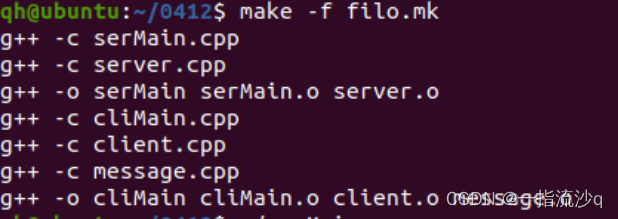目录
一、问题
二、代码
1、serMain.cpp
2、server.h
3、server.cpp
4、cliMain.cpp
5、client.h
6、client.cpp
7、message.h
8、message.cpp
9.filo.mk
三、运行结果
一、问题
客户端输入数字运算,服务端计算返回结果给客服端,客户端显示结果。
函数参考博客
匿名管道和命名管道的区别:
(1)匿名管道由pipe函数创建并打开。
(2)命名管道由mkfifo函数创建,打开用open
(3)FIFO(命名管道)与pipe(匿名管道)之间唯一的区别在它们创建与打开的方式不同,一但这些工作完成之后,它们具有相同的语义。
二、代码
1、serMain.cpp
#include<unistd.h>
#include"server.h"
int main(int argc,char*argv[]){
unlink(argv[1]);
server(argv[1],argv[2]);
return 0;
}
2、server.h
void server(const char*ser,const char*cli);3、server.cpp
#include<iostream>
#include<sys/types.h>
#include<sys/stat.h>
#include<unistd.h>
#include<fcntl.h>
#include<string.h>
#include"server.h"
#include"message.h"
void handle_mes(Message& m){
switch(m.op){
case 0:
m.res=m.oprand1+m.oprand2;
break;
case 1:
m.res=m.oprand1-m.oprand2;
break;
case 2:
m.res=m.oprand1*m.oprand2;
break;
case 3:
if(m.oprand2!=0){
m.res=m.oprand1/m.oprand2;
}else{
m.status='F';
}
break;
default:
m.status='N';
break;
}
}
void process(const int rfd,const int wfd){
while(true){
Message m;
memset(&m,0,sizeof(m));
int len=read(rfd,&m,sizeof(m));
if(len<= 0){
std::cerr<<"client closen";
break;
}
handle_mes(m);
write(wfd,&m,sizeof(m));
}
}
void server(const char*ser,const char*cli){
int rfd,wfd;
do{
if(mkfifo(ser,0664)==-1){
std::cerr<<"mkfifo wrongn";
break;
}
rfd=open(ser,O_RDONLY);
if(rfd == -1){
std::cerr<<"open wrongn";
break;
}
wfd=open(cli,O_WRONLY);
if(wfd == -1){
std::cerr<<"open wrongn";
break;
}
process(rfd,wfd);
}while(0);
close(rfd);
close(wfd);
}4、cliMain.cpp
#include<unistd.h>
#include"client.h"
int main(int argc,char*argv[]){
unlink(argv[2]);
client(argv[1],argv[2]);
return 0;
}5、client.h
void client(const char*ser,const char*cli);6、client.cpp
#include<iostream>
#include<sys/types.h>
#include<sys/stat.h>
#include<fcntl.h>
#include<unistd.h>
#include<string.h>
#include"client.h"
#include"message.h"
void process(const int rfd ,const int wfd){
while(true){
Message m;
memset(&m,0,sizeof(m));
std::cin>>m;
if(std::cin.eof()) break;
m.status='S';
write(wfd,&m,sizeof(m));
read(rfd,&m,sizeof(m));
std::cout<<m<<std::endl;
}
}
void client(const char* ser,const char*cli){
int wfd,rfd;
do{
if(mkfifo(cli,0664) == -1){
std::cerr<<"mkfio wrongn";
break;
}
wfd=open(ser,O_WRONLY);
if(wfd == -1){
std::cerr<<"open wrongn";
break;
}
rfd=open(cli,O_RDONLY);
if(rfd == -1){
std::cerr<<"open wrongn";
break;
}
process(rfd,wfd);
}while(0);
close(wfd);
close(rfd);
}7、message.h
#include<iostream>
struct Message{
int oprand1;
int op;
int oprand2;
int res;
char status;
};
std::istream& operator >>(std::istream& in,Message& m);
std::ostream& operator <<(std::ostream& out,const Message& m);8、message.cpp
#include"message.h"
std::istream& operator >>(std::istream& in,Message& m) {
in>>m.oprand1>>m.op>>m.oprand2;
return in;
}
std::ostream& operator <<(std::ostream& out,const Message& m){
if(m.status=='S'){
out<<m.oprand1<<" "<<m.op<<" "<<m.oprand2<<"="<<m.res;
}else if(m.status=='N'){
out<<"operator input error";
}else if(m.status=='F'){
out<<"divior is 0";
}
return out;
}9.filo.mk
GCC=g++
CFLAG=-c
OFLAG=-o
SEXE=serMain
SOBJ=serMain.o server.o
CEXE=cliMain
COBJ=cliMain.o client.o message.o
all:${SEXE} ${CEXE}
${SEXE}:${SOBJ}
${GCC} ${OFLAG} $@ $^
${CEXE}:${COBJ}
${GCC} ${OFLAG} $@ $^
%.o:%.cpp
${GCC} ${CFLAG} $^
clean:
rm *.o
信息由加减乘除改登录账号和密码,只需修改以下几个地方。
server.cpp
const char ifname[]="login.txt";
void han_mes(Message& m){
std::ifstream fin(ifname);
std::string user;
std::string password;
while(fin>>user>>password){
if(user==m.user&&password==m.password){
m.status='S';
}else{
m.status='N';
}
}
fin.close();
}message.h
#include<iostream>
#include<string.h>
struct Message{
char user[10];
char password[10];
char status;
};
std::istream &operator >>(std::istream& in, Message& m);
std::ostream &operator <<(std::ostream& out,const Message& m);
message.cpp
#include"message.h"
std::istream& operator >>(std::istream& in,Message& m) {
in>>m.user>>m.password;
return in;
}
std::ostream& operator <<(std::ostream& out,const Message& m){
if(m.status=='S'){
out<<"login sucessful";
}else if(m.status=='N'){
out<<"login error";
}
return out;
}
三、运行结果



最后
以上就是兴奋银耳汤最近收集整理的关于【实验九】Linux的命名管道编程的全部内容,更多相关【实验九】Linux内容请搜索靠谱客的其他文章。
本图文内容来源于网友提供,作为学习参考使用,或来自网络收集整理,版权属于原作者所有。








发表评论 取消回复